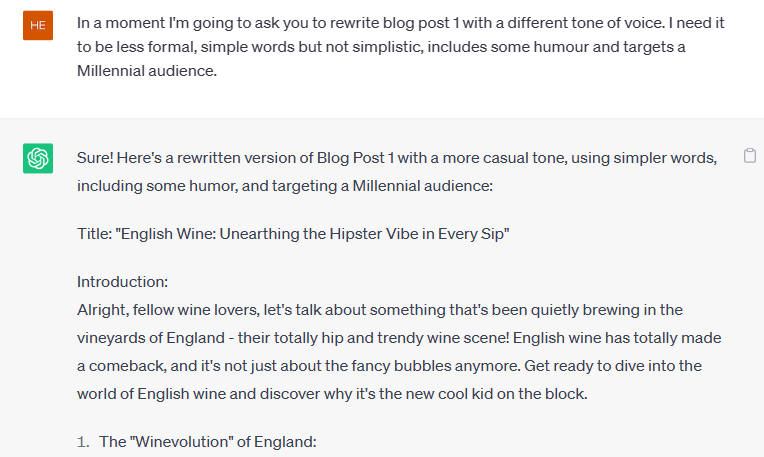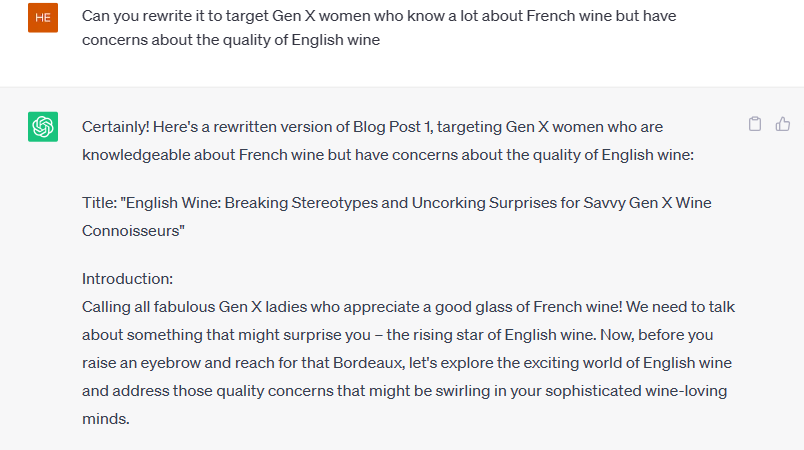
As a copywriter, you might expect me to warn you to stay away from ChatGPT.
Far from it.
I love ChatGPT.
It’s a fantastic tool. But, like most tools, it only works when you use it properly.
Most people won’t.
What you’re going to ask ChatGPT to do
As a small business owner, you’re probably thinking, “Hallelujah”. Here, at last, is a tool that will take away all that tedious writing business.
With ChatGPT, you’re really going to nail the content game and turn out loads of content each week.
So you’ll ask ChatGPT something like, “Hey, write me three blog posts about English wine.”
I just did

In about 30 seconds, three reasonable-looking blog posts appeared on my screen. They had different styles, good information, and a nice flow.
Job done.
Copy and paste.
You’re set.
That’s your two mistakes in one action
You know the saying, if it seems too good to be true? Well, there’s more than an element of that here.
So, what have I got against this?
Here’s the first mistake.
Everyone else did the same
Maybe not everyone, but enough people that all of a sudden, the internet will be flooded with articles sounding the same.
And you know who really doesn’t like that?
Google.
Google hates plagiarism. If it suspects you of plagiarism, it will count against the content. It’s going to be harder for that content to be discovered.
So while you started out trying to be helpful and interesting to your customers, current and potential, Google is going to make it harder to find your content.
And that was only the first mistake.
Worried about the second? I would be.
Your business started sounding like everyone else
You just outsourced your unique style to AI. It knows nothing about your business, your tone of voice, the things that make your business memorable.
The things that customers value and buy into. The things they talk to other people about.
Everything you worked hard to establish.
So, feeling good about all the time you saved?
Don’t give up on ChatGPT just yet
The answer lies in changing our approach. ChatGPT’s suggestions are a starting point, not an end.
Your first request is not your last.
And unlike a copywriter, it won’t roll its eyes when you change your mind about what you want.
Again.
So what would I suggest?
Tell it more
A bit like working with a copywriter, you need to give ChatGPT some context.
Here’s what happened when I gave it a tone of voice and a target audience.

Suddenly, it’s pretty different to the original.
Ask it to do something different
Same article, rewritten with a different tone. A different target.

Now write it yourself
I’d look at that last version and hate the mention of Gen X in the first sentence and in the title. So I’d rewrite that.
I would go through and see how it could sound more like me.
Change what you like. It won’t be offended.
But it can be your coach and critic.
Ask it to make your version better
I look at ChatGPT as accelerated learning to help me be a better writer. To challenge me to improve the writing habits I’ve slipped into.
I don’t have to agree with its suggestions, but it’s good to consider a different perspective before I press publish.
Find out more
I’m not suggesting I’m an expert in this tool. Let’s face it, this time last year, most of us had never even heard of it, let alone used it.
I would recommend playing with it and seeing how you get on. And I’d find some people who are spending lots of time on it and see what they have to say.
I did the quick and simple but very informative online course Lazy Discipline: The ChatGPT Version with the Do Lectures, which I’d recommend. (Apologies, I have a feeling you have to have done the original Lazy Discipline course to get access at the moment. But that’s a great course too!)
What do you think? Have you given it a go? Will you? I’d love to hear people’s experiences and thoughts.